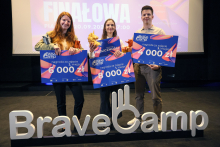BraveCamp is an entrepreneurship academy organized by the University of Warsaw Incubator, which is attended by students from MUW and UW, and from this edition - also from the Leon Kozminski Academy. The 12th edition of the BraveCamp Entrepreneurship Academy was held under the honorary patronage of the Marshal of the Mazowieckie Voivodeship and the Minister of Science and Higher Education.
A week of intensive workshops and training
Participants in the 12th edition, and there were 24 of them, spent a week at the Geological Education Center in Chęciny, where they worked on their projects under the guidance of experts. They learned how to develop their idea, but also how to present it to investors in order to bring it to finalization, i.e. entering the market. They had classes on topics such as Service Design Thinking, market analysis, competitive analysis, brand building and brand communication or corporate social responsibility.
The 10 best projects were selected for the finals. Among the finalists, in addition to Magdalena Justyniarska, was another medical student, Sylwia Adamus, who is also studying neuroinformatics at the UW. Her project concerned the creation of an application for people who use the services of psychiatrists to help monitor the treatment process.
The final of the 12th Edition of BraveCamp
The finalists competed for three main financial prizes. An audience award, an award from alumni of previous BraveCamp editions and an award from UWRC Ltd. were also awarded.
The participants in the finals presented their ideas to a jury consisting of Małgorzata Sikorska, Head of Execution Leaders at Nordea Polska; Dr. Maciej Plebanek, Medical Director of Pfizer Ukraine, Deputy Medical Director of Pfizer Poland; Krzysztof Jan Turzyński, MD, PhD, university Prof., Vice Dean for Student Affairs, Faculty of Physics of the University of Warsaw; Julia Staszczak, investment analyst at Market One Capital VC; Aleksandra Pucek-Mioduszewska, Career and Community Relations Office, Leon Kozminski Academy - Kozminski University; Krzysztof Gulda, member of the Board of UWRC, a special purpose vehicle of the University of Warsaw.
The winners of the 12th edition of BraveCamp were:
- 1st place and Audience Award: Weronika Bagniewska, University of Warsaw for her project ESI - revolution in note-taking and learning - an application/platform for consolidating knowledge from notes using AI and gamification;
- 2nd place and UWRC Award: Magdalena Justyniarska, Medical University of Warsaw for the project Cellbeing - Light microscope accessory analyzing culture images in real time;
- 3rd place: Andrzej Malinowski, Leon Kozminski Academy for the Parently project – the marketplace for parents;
- The BraveCamp Alumni Award went to Paulina Rosiek from the Doctoral School of Science and Life Sciences UW for her Science in the Field project - a mobile app combining the ideas of non-formal education and urban games.
Cellbeing - supporting scientists in conducting cell culture
Magdalena Justyniarska's idea is to construct a light microscope accessory that would read and analyze the real-time image of survival culture. An additional component would be a sensor noting the color and clarity of the culture medium. The device would generate a culture status report on demand, which could be printed and included in lab notes. In addition, the software would include elements of artificial intelligence, which would be based on data from portals that provide data on cell lines, such as ATCC or DSMZ. It would also tell what state the cells are in and, based on model images, suggest the best time to schedule an experiment.
-My idea for the project came from a series of unsuccessful experiments I was conducting in the lab - explains Magda Justyniarska - I thought to myself that if there was something that could prevent many of the dilemmas associated with cell cultures, we scientists would save a ton of time and be able to focus on other research issues.
Participating in BraveCamp gave Magdalena the opportunity to do something new and different, and to learn how to think about an idea from a design perspective.
- I wanted to see how projects are worked on from a more business-like and structured perspective. I learned what needs to be taken into account to create something viable.
